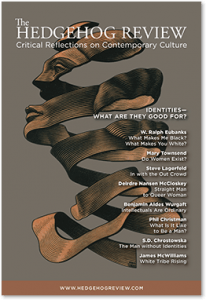Phil Christman in The Hedgehog Review:
 At the time my wife and I were beginning to date, I owned a broken bed. The box spring had a biggish crack on one side, which caused you to feel like you were being gradually swallowed in the night—an effect seriously exacerbated by the presence of a second person. I had not bothered to buy pillows when I moved to Milwaukee, reasoning that old pants stuffed in a pillowcase could not possibly feel that different. I did, however, have a desk, which I had carried from the Salvation Army, a mile and a half, on my shoulders, in August. I should mention here that I have never been what anyone would consider macho. It simply hadn’t occurred to me that I was allowed to live any other way.
At the time my wife and I were beginning to date, I owned a broken bed. The box spring had a biggish crack on one side, which caused you to feel like you were being gradually swallowed in the night—an effect seriously exacerbated by the presence of a second person. I had not bothered to buy pillows when I moved to Milwaukee, reasoning that old pants stuffed in a pillowcase could not possibly feel that different. I did, however, have a desk, which I had carried from the Salvation Army, a mile and a half, on my shoulders, in August. I should mention here that I have never been what anyone would consider macho. It simply hadn’t occurred to me that I was allowed to live any other way.
My wife now amuses guests by narrating this period in our lives in the sitcom gender-essentialist mode: the silly, uncivilized man; the patiently exasperated woman.1 I defend myself by citing my actual poverty at the time—I was a graduate student with no savings, from a working-class family, for whom a $12,000 yearly stipend was a massive windfall. But she and I are both right: My choices rested on many years of socialization, as much as they unfolded against a background of economic precarity. Were there not buses? Could I not have asked a friend with a car to help me? Who purchases a Riverside Chaucer and a copy of the Go-Betweens’ 16 Lovers Lane before he gets around to pillows? I would never have put myself through all of that if I hadn’t spent my life believing that it was my job to be, precisely, a man.
More here.
